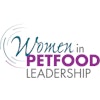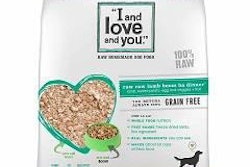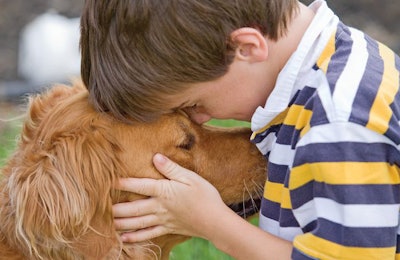
Companies often find themselves in the position to give back to their communities, and those in the pet food industry are no different. But with so many organizations in need and only so much time and money and manpower to go around, it can be difficult to fulfill the goal of being a good corporate citizen while ensuring everyone gets what they need out of a philanthropic arrangement.
Find alignment with your company values
“We recommend identifying partners that align with your company's values, size and what your consumer community is passionate about,” said Nate Phillips, CEO of NomNomNow. “We know our customers are particularly focused on giving their pets the healthiest lives possible. Our KetoPet Sanctuary relationship allows us to support an organization that not only benefits an underserved group of dogs but is also working on research that could prevent canine cancer from afflicting more of our beloved pets.”
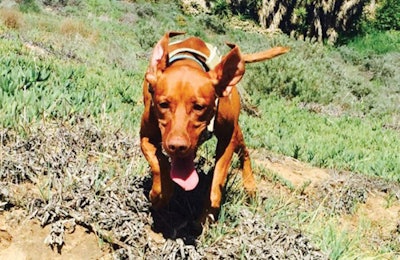
Cali the Vizsla is one of the residents of KetoPet Sanctuary, a place that provides cancer treatment and a "forever home" to dogs that are considered unadoptable due to their cancer diagnosis. | Photo courtesy of KetoPet Sanctuary
KetoPet Sanctuary provides cancer treatment and a "forever home" to a population of dogs that are considered unadoptable due to their cancer diagnosis. In addition, the organization has documented successes in improving the quality of life for a number of dogs through its nutrition-based cancer treatment protocol and is working on research that could even benefit human health.
“The organization’s mission is in line with our values,” said Phillips. “At NomNomNow, we believe that all dogs deserve happy, healthy and long lives, which is why we founded our company. Quality nutrition is essential to pet quality of life. KetoPet Sanctuary is similarly oriented.”
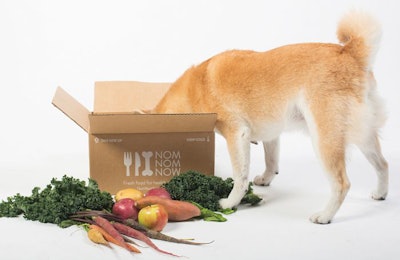
NomNomNow has partnered with KetoPet Sanctuary to help serve the Sanctuary’s canine residents. The company says that the Sanctuary was an excellent fit for NomNomNow’s philosophy that all pets deserve to live the happiest, healthiest, longest lives possible. | Photo courtesy of NomNomNow
Making philanthropy a cornerstone of your company can open up opportunities when it comes to giving back.
“At Barkworthies, the practice of giving back is deeply embedded in the guiding principles of our company,” said Timothy Fabits, vice president of sales at Barkworthies. “If there’s one thing we all agree on, it’s that we are dedicated to ensuring the health and happiness of every pet, every day. Our dedication to supporting animal shelters and rescue organizations even shows in our brand identity, as all of our advertising materials and packaging feature exclusively rescue dogs as models.”
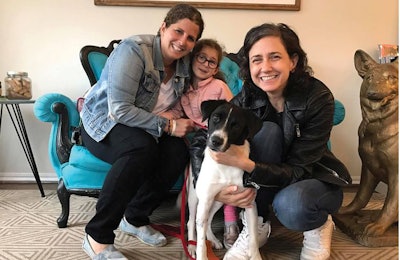
Barkworthies’ Chews Rescue program was founded to address the plight of shelter animals and actively encourage their adoption. This family adopted their new furry family member in 2017 from One Tail at a Time, a Chicago-based shelter, with adoption fees sponsored by Barkworthies as part of Chews Rescue. | Photo courtesy of One Tail at a Time
Barkworthies created the Chews Rescue program in 2016 to raise public awareness about the plight of shelter pets and actively encourage people to adopt them. The program is “a comprehensive social media and public relations campaign that was developed as a tribute to everyone that assists in animal rescue and the positive impact it makes on individual families and the community,” said Fabits. One of the first things the program did was donate US$10,000 to the Richmond Animal League, a shelter local to Barkworthies, as well as raise over US$3,000 that also went to the League.
Now, the program is celebrating its second year. “Throughout April [2017] we ran a campaign promoting ‘National Adopt a Shelter Pet Day (4/30)’,” said Fabits. “As part of the program, we partnered with three deserving shelters — Austin Pets Alive!, Chicago Canine Rescue and One Tail at a Time — and donated a total of over US$22,000 to help cover the adoption fees for eligible dogs over the last weekend in April 2017. Best of all, we’re proud to report that we helped over 75 shelter dogs find their forever homes. Needless to say, plans are already underway to stage another program that helps support and promote rescues.”
When you give, you get: the philanthropic spirit
Building a solid relationship with your community isn’t always easy in the days of social media and bloggers and instant feedback (for better or worse). Truly being involved in that community is one way to make sure everyone knows what your company’s about.
“We donate to and support as many local organizations as possible that help out pets in need, and the driving force behind them is that there should never be a missed meal in any shelter or rescue,” said Tony Smith, chief culture officer at Bentley’s Pet Stuff. “I don’t think we can define how important it is for our team members to have the relationships they do with their local rescue organizations, shelters, pet food pantries and more. Without the driving passion of our teams and supporting the communities they’re in, we wouldn’t be able to help be a part of saving as many animals as we have.”
Sometimes, an unexpected disaster can be the catalyst for serving a community. Take, for example, the recent hurricanes that have hit the US.
“The moment we learned of the devastating hurricanes approaching the US, we knew we had to jump into action,” said Lindsey Rabaut, director of marketing and operations for I and love and you. “There was no question that we would help. As an organization that is built on the emotional bond between humans and their pets, we couldn't imagine the stress of having to either evacuate with our pets, or worse becoming separated from them. Our compassion was struck. We knew that we had to send meals and treats.”
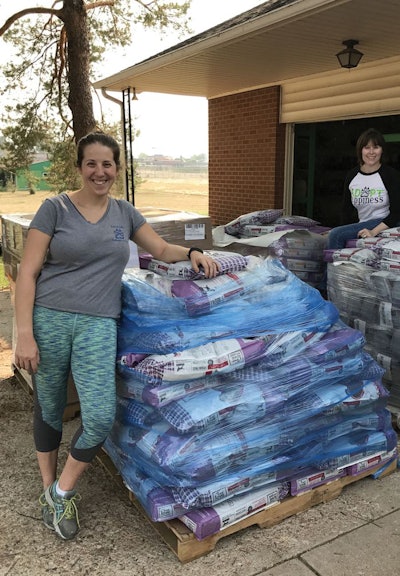
I and love and you sent pallets of food to pets affected by Hurricane Harvey, in part through Colorado-based Life is Better Rescue, which sent supplies and people to the Houston area to help in the hurricane’s aftermath. | Photo courtesy of Life is Better rescue
The company leveraged its relationships with a network of rescues, shelters and animal welfare groups to get pet food to Houston, where Hurricane Harvey did significant damage, as soon as possible.
“The day after Harvey hit we found a truck leaving Boulder [Colorado, USA] headed for a Houston food pantry and we arranged to have two pallets on that truck which ended up helping those who evacuated with their pets,” said Rabaut. “Then, we arranged for multiple pallets of dog and cat food (and treats) to be sent to the Humane Society of Tulsa [in Oklahoma, USA]. The Humane Society of Tulsa is an emergency shelter for the Humane Society of the United States, and helped house many displaced dogs in the days after Hurricane Harvey. Next, we sent multiple pallets down to Texas with one of our long-time animal rescue partners, Life is Better Rescue, located in Denver, Colorado, USA. They delivered hundreds of pounds of food to the shelters in Texas and returned to Colorado with over three dozen rescued dogs and cats. Finally, we sent four more pallets of dog and cat food with Hope for Paws.”
The Lucy Pet Foundation also sprang into action in the hurricanes’ aftermath, making use of all the resources at its disposal to transport animals to safer areas.
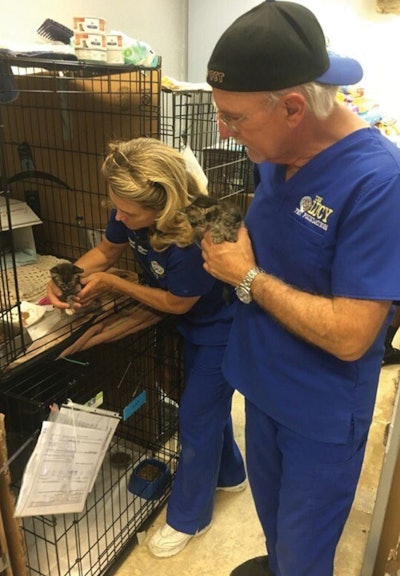
Lucy Pet Foundation Founder Joey Herrick works with Chief Veterinary Officer Karen Halligan to assess kittens for transport in the aftermath of Hurricane Harvey. | Photo courtesy of Lucy Pet Foundation
“The Lucy Pet Foundation has been hard at work helping transport adoptable Houston shelter pets to new forever homes to make much-needed room for incoming animals affected by Hurricane Harvey,” said the Foundation. “Most recently Joey Herrick, the founder of the Lucy Pet Foundation, chartered a plane to transport 64 dogs and cats to forever homes in the Oakland, California [USA] area.”
The foundation also made a public service announcement appealing to people to donate in the wake of the hurricane.
More than enough to go around
At the end of the day, there’s no shortage of ways for pet food companies to be involved in their communities. The trick is building partnerships that speak to a company’s identity as well as benefit everyone involved.
“When there is a need, it is part of our identity as a brand to lend a hand to benefit the welfare of dogs and cats,” said Rabaut.
Education is also key, said Fabits. “I recommend having an internal meeting with your team to discuss the different opportunities and ways in which you can become involved in pet-related philanthropic efforts,” he said. “Educating your staff is important to help them better understand the importance and meaning behind these efforts. I’d also suggest that they listen closely to what shelter and rescue organizations are trying to achieve and make sure their programs are aligned with these goals.”
And, of course, companies should never underestimate the “feel good” factor of being a good corporate citizen. “The organizations we partner with are also community driven, and through their volunteer efforts they’re saving more lives than they ever thought possible,” said Smith. “It’s an amazing feeling to find organizations that speak about saving animals and finding them forever homes just as passionately as all of our teams speak to helping them thrive, not just survive.”
How pet food companies can get involved in giving back

